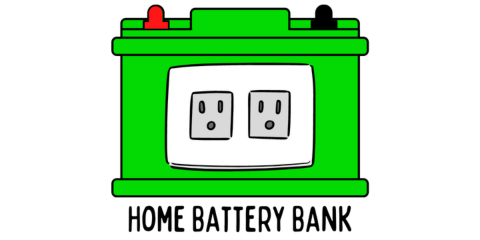One of the first things to cross everyone’s mind is does the water still work when the power goes out.
Water makes hydration, personal hygiene, cooking, cleaning, and waste removal all possible.
There are lots of caveats, but the broad answer depends on where your water source originates and how it exits your home after it has been used.
Municipal water will work during a power outage until your local water tower empties or the city turns on its backup generators. Water from a private well pump will not work during a power outage without a portable generator.
That’s the quick and easy answer to a question with lots of variables. Below is a table that outlines the most common items associated with water usage and whether or not they will work when the power goes out.
| Part of the Plumbing System | Will it Work in a Power Outage? | Notes: |
|---|---|---|
| City Water to Home (Showering, Sinks, Toilets) | Yes | Until city water tower runs out. City may have backup generators. |
| City Water to Apartment | Not Likely | Complex has its own electric water pump to disperse water to individual units |
| City Water to Multi-level Building | No | Building will have its own electric water pumps |
| Private Well at Home (Showering, Sinks, Toilets) | No | Generator and Transfer Switch will Power It. Will have water for a short time from the pressure tank. |
| Private Drain Field (Septic) | Yes* | *If Gravity Fed |
| Private Drain Field (Pump Assisted Septic) | No | Generator and Transfer Switch Will Power It |
| Pump Assisted Sewer System (including Grinder Pumps) | No | Can Power with Generator |
| Sump Pumps | No | Can Power with Generator |
| Tankless Water Heater | No | Power Requirements too high for a portable generator |
| Pump Assisted Toilets | No | Can Power with Generator |
| Electric Water Heater | No | Extremely large generator required to power this. Impractical. |
| Gas Water Heater | Maybe | Gas is rarely disrupted by power outages. Check your unit for a wall cord that might control sensors. If none, then it will work. |
Water from Municipal Sources (City Water)
In theory, city water will continue to work up until a point. In reality, there are those who will get water and those who won’t depending on the particular structure they find themselves in when the lights go out.
Generally, city water, or municipal water, is pumped up via electricity from the ground to the top of a water tower. From there it is sent to your home via water pressure and gravity. Your home is lower than the water tower and water will always seek the lowest point.
Your home will have water if it is hooked up to the city. It will have water as long as there is still water in the water tower for gravity to send your way. You may experience a lower water pressure on higher floors of your home. This is especially true the longer the outage lasts since water is being used by other homes and there won’t be as much pressure in the system to push the water up (against gravity) to your second or third floor.
You may also experience lower water pressures the longer the outage lasts since no new water will be pumped into the water tower unless the city powers up its backup generators. It’s best to plan ahead, and we’ll get to that later.
With that being said, there are those who will not be able to access the water even when their plumbing is connected to municipal water. If the building you’re in has its own pressure tank or system that diverts water to different locations on a particular property, then you won’t have water.
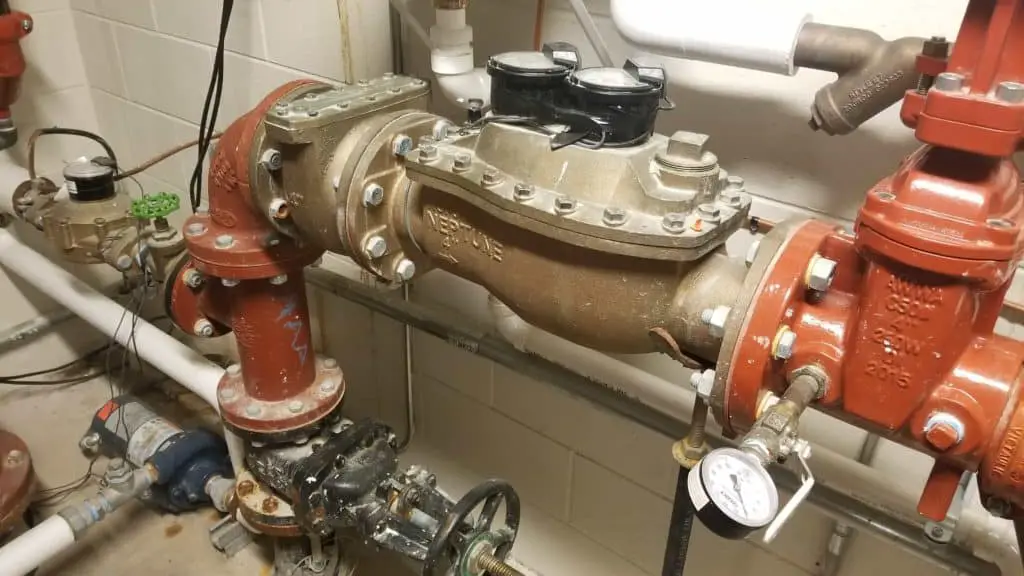
Buildings that will generally NOT have water are:
- Apartment Complexes
- Tall buildings such as hotels and high rises
Both of these types of buildings will have their own pumps and pressure systems that require electricity to operate. Without it, the water essentially dead-heads at the point of the pump and won’t be allowed to pass without power. If a building has its own backup generator, then this problem may be solved.
Water from a Private Well
Nothing is tastier than water from a clean well, but unfortunately water wells will require electricity to operate. So, unless its summer, you have a hand pump, and you want to carry buckets of water back and forth, then I’m going to assume you will not have water when the power goes out.
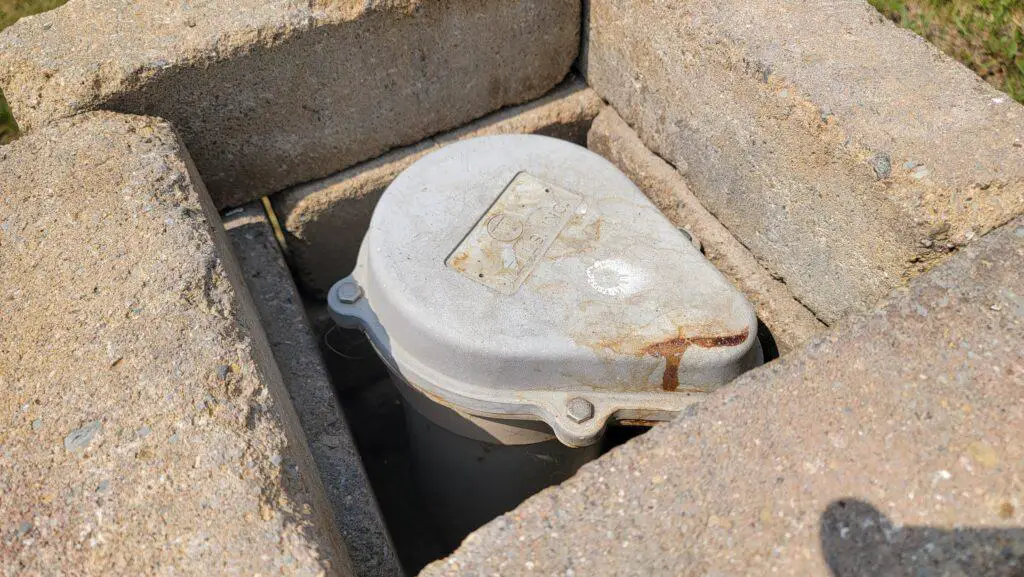
That can be easily remedied though, with a portable generator.
In order to get “water from a stone”, so to speak, we are going to need a properly-sized generator to overcome the starting watts of your well pump so that you and your faucets can be best friends again.
Below is a table with the most common well pump sizes and the recommended generator size to accompany it.
| Well Pump Horse Power (HP) | Running Watts | Starting Watts | Recommended MINIMUM Generator Size |
|---|---|---|---|
| 1/3 HP | 750 | 1,500 | 3,500 Watts |
| 1/2 HP | 900 | 2,000 | 3,500 Watts |
| 3/4 HP | 1,500 | 3,000 | 5,000 Watts |
| 1 HP | 2,000 | 4,000 | 5,000 Watts |
If you’re unsure what generator to buy and are looking for a couple solid choices, I don’t think you can go wrong with this mid-sized model on Amazon (Model: XP4400EH) for powering your 1/3HP and 1/2HP well pumps. It is duel-fuel and has wheels as well, so you can use either propane or gasoline.
A larger model that could power your 3/4-1HP well pumps would be something like this model on Amazon which is also dual-fuel and has wheels. I’ve worked on these brands of generators and know people who own them and would have no problem relying on them for backup power.
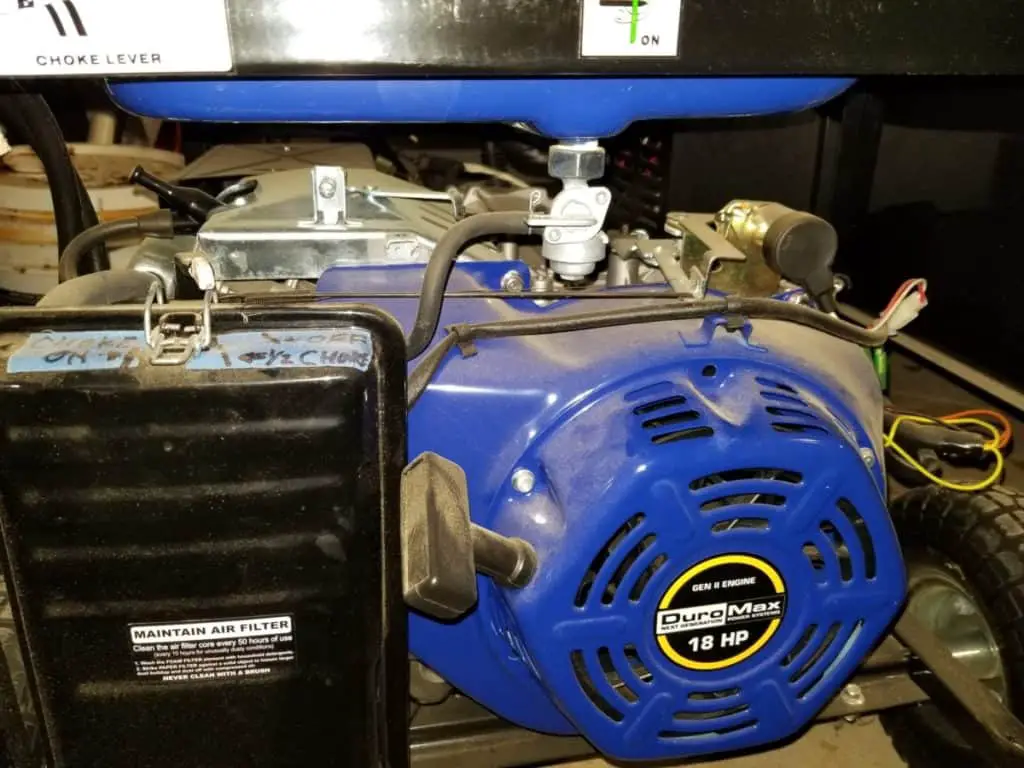
The odds are that your well pump is hardwired to your breaker box, so you can’t simply plug it into a generator. You will either have to backfeed the power from the generator to the house (not recommended) or have a professionally installed transfer switch ahead of time.
Just keep in mind that if you have no idea what “back-feeding” is, you shouldn’t attempt it with your generator. It can be very dangerous and deadly if done incorrectly. I highly recommend having a transfer switch or interlock kit professionally installed at your breaker box to reduce the chance of harm to yourself, your family, or a lineworker trying to restore your power.
If you backfeed power incorrectly into your home and kill a lineworker two blocks away, you will be held liable.
I will not discuss how to back feed a generator, as it is a process that is illegal in many (if not all) jurisdictions and for the sake of liability.
Does Plumbing (Wastewater) Work During a Power Outage?
Just like gravity is our friend when it comes to city water flowing to our homes, so is gravity our friend when it comes to getting rid of our waste water (gray or black).
If your home is hooked up to the city sewers or to your own septic and drain field, the wastewater will still properly leave your home as long as everything is gravity fed.
If your home relies on a pump assist or a grinder in any way, then it will not function without power and your wastewater will eventually backup into your home.
Toilets in basements often have pump assists for flushing to overcome the power of gravity in order to get the waste out the mainline that leaves your home. Some septics systems (outside your home and buried) have a pump assist to move wastewater from one area to another in order to overcome gravity as well — if your drain field is above your septic, for instance.
If your whole system is gravity fed except for a single toilet with a pump assist, just refrain from using that toilet when the power is out. However, if your house is connected to a grinder pump that gets your waste ready for the sewers, then you will only have so many flushes or shower time until things back up through your drains.
Can you Shower When the Power is Out?
It goes without saying that showering while there’s a lighting storm outside is not the best idea. Don’t just take my word for it, take it from the CDC.
Once the lighting has passed and the lights are still out, we have a few things to consider before showering.
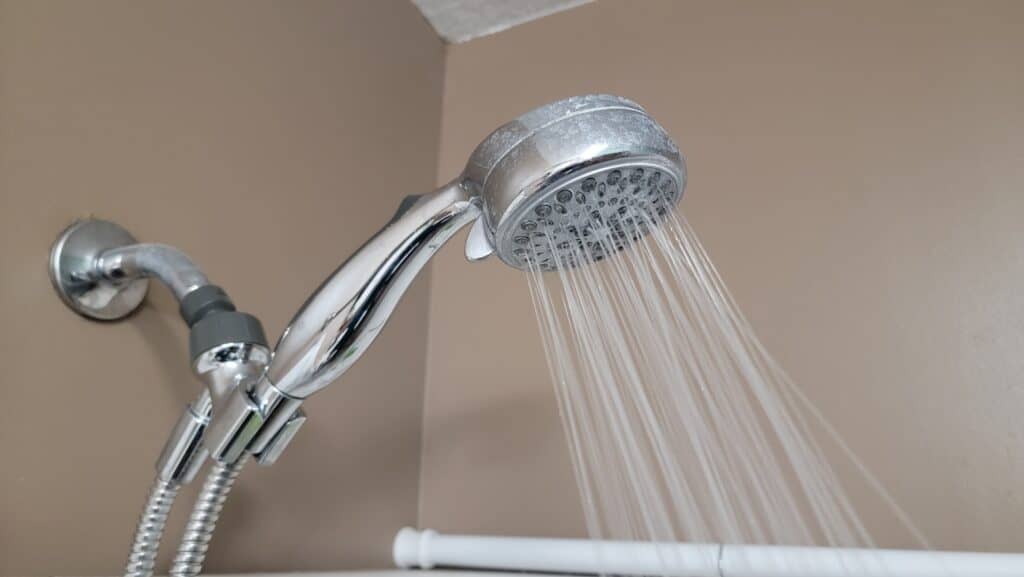
First, will we have water? You’ll have to use the advice above but if you have city water then you will have water (most likely), and if you have a well you will need to hook up a generator to a transfer switch.
Second, will the water drain. Again, you’ll need to assess your situation based on the topic above, but as long as your system is gravity fed from the shower drain to your drain field or sewer hookup, then yes, you can shower.
Third, and perhaps the most important when it comes to showering, is whether or not you’ll have hot water. That takes us into our next topic.
Does the Hot Water Work During a Power Outage?
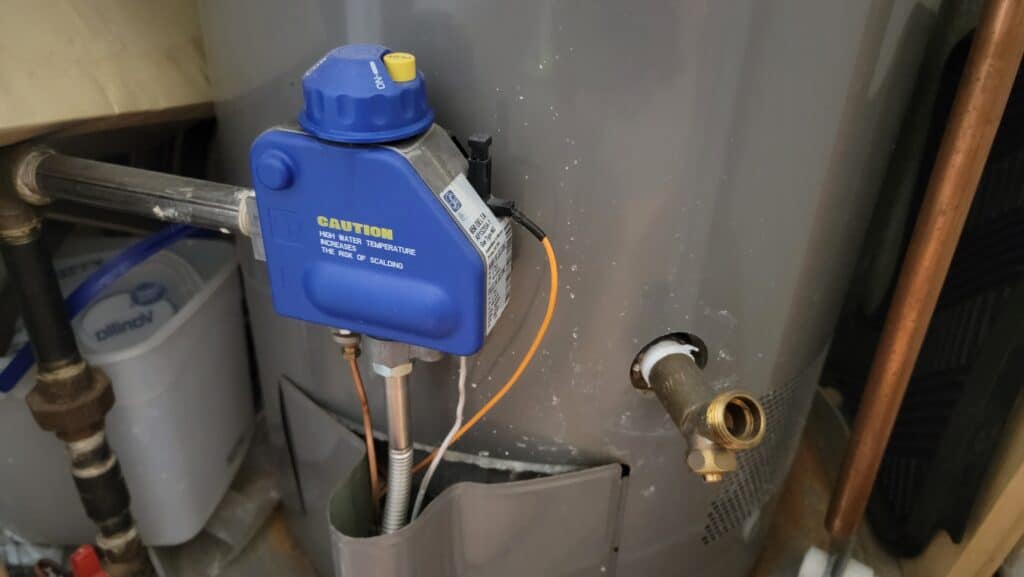
| Type of Water Heater | Will it work in a power outage? | Notes |
|---|---|---|
| Electric | No | A very large generator may be used (10kW or greater). Consult an electrician to find your optimum setup. |
| Tankless | No | Power requirements too great for most portable generators |
| Gas/Propane | Maybe | Tanks with no cords that plug into the wall will still work. Tanks that plug into the walls to power sensors will not work. |
If you have an electric water heater tank, then you will have the hot water that was in the tank at the time of the power outage to shower with — so make the most of it.
Tankless water heaters will not function without electricity and have too high of power requirements for portable generators.
Gas or propane water heaters will continue to function as long as they are not hooked up to wall power in any way for the sensors or whatnot. If yours does not have a wall plug, then you will be in business.
Natural gas will not be affected by your typical power outage. In most cases, you would need something like an earthquake to disrupt the gas lines underground.
Can you Flush the Toilet When the Power is Out?
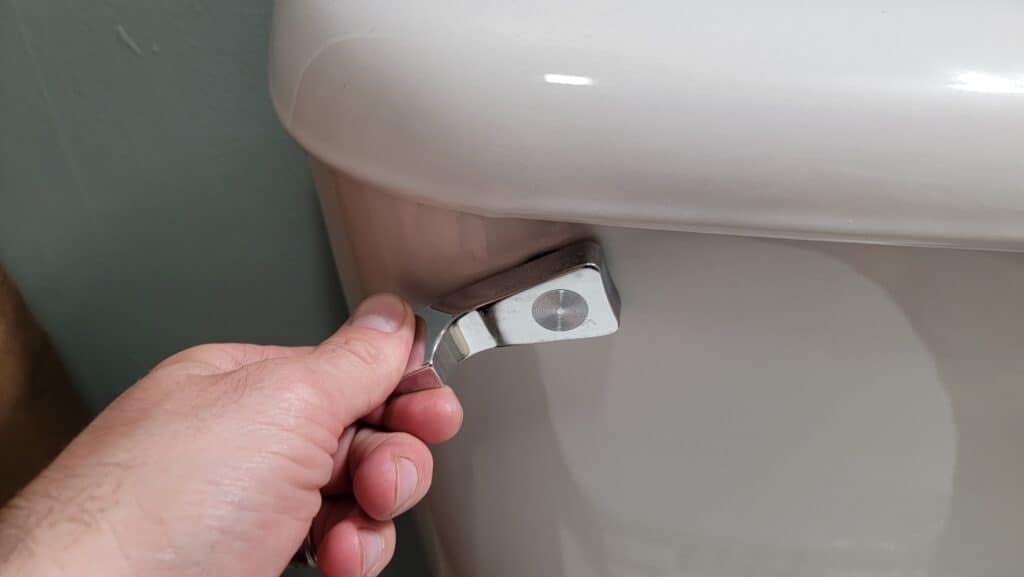
As long as your toilet does not have an electric pump in the back (or mounted in the wall) to overcome gravity, or a pump anywhere in the system that helps to overcome gravity, then you will be able to flush.
If you have a grinder pump or a pump assist, then you will only have so many flushes until things back up through your drains. These pumps require electricity and will not work without it.
If your entire plumbing line is gravity fed from the toilet to its final destination, then you can flush your waste.
It’s definitely good to establish all of these facts before the power goes out so you’re not left guessing.
Should I Fill My Bathtub Before a Power Outage?
Filling your bathtub is an easy way to ensure that you’ll at least have a decent amount of water for manual toilet flushing (with a scoop), washing, and external hygiene.
Many drain stops have a slight leak to them, so it’s not a bad idea to dry the drain area and lay down a strip or two of tape from the hardware store to double the protection before your full the tub.
To flush the toilet with the tub water, simply cut off the top of a plastic gallon milk jug to make a scoop and either remove the top of the reservoir tank and pour the water in for flushing like normal, or simply pour the water straight into the toilet at a relatively fast pour and aimed at the drain area of the basin.
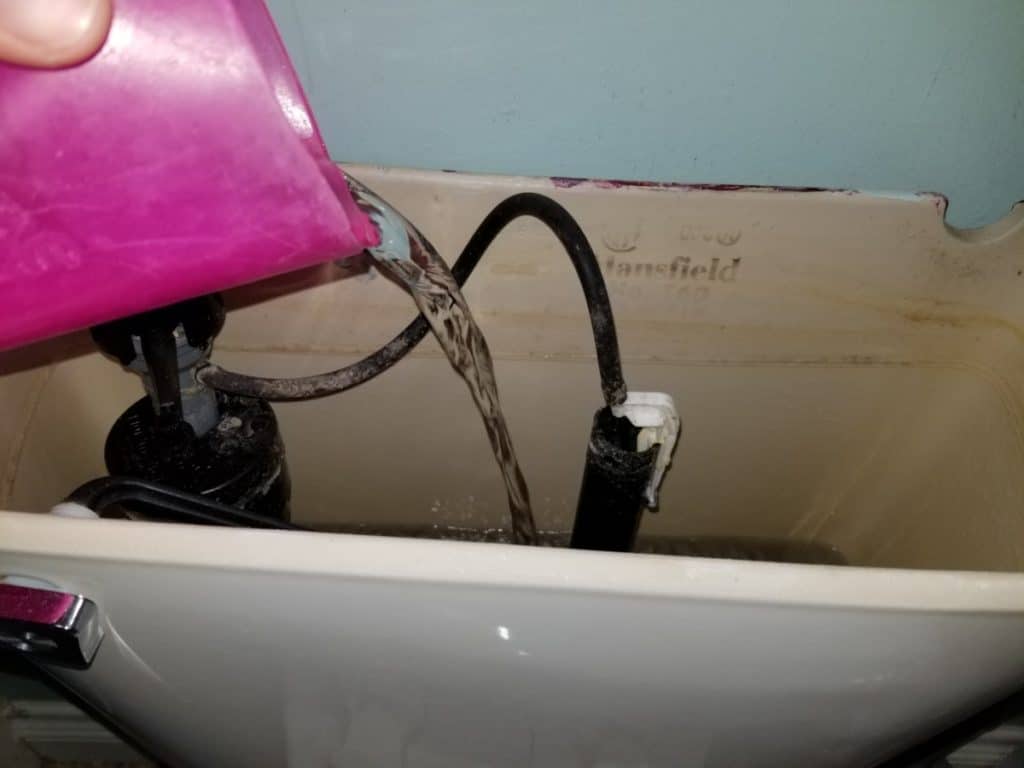
If you get it right, the toilet will flush itself. However, right or wrong, you risk some splashback, so it might not be a bad idea to simply pour some water in the reservoir so you can flush like normal.
Can I Drink Water from a Bathtub in an Emergency?
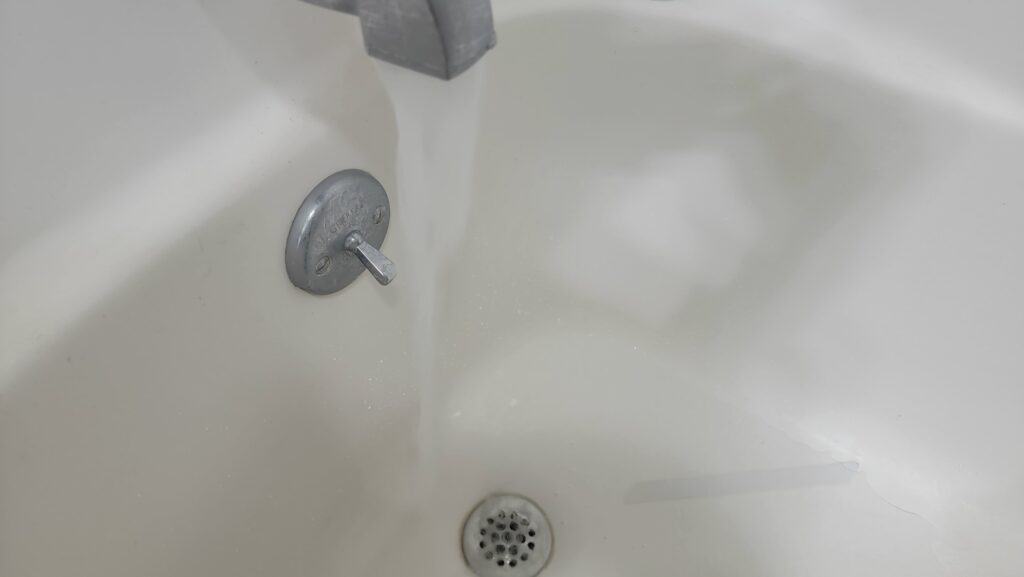
Water from your bathtub can harbor viruses, molds, chemicals, soap scum, bacteria, and is not suited for internal use or drinking.
Unless you’re on the brink of death from thirst, there is no reason why you should drink water from the tub. Considering how easy it is to store potable water, it’s hard to find an excuse. Let’s get to that next.
The Importance of Storing Water for a Power Outage
It’s a wise idea to check out what Ready.gov has to say about water storage to get a baseline understanding of what you should be doing.
From my experience, the only problems with storing water are that water takes up space and choosing the wrong containers can lead to lots of leaks.
I chose to line the entire perimeter of my crawlspace with gallon jugs, as you can see from the picture below. The number of gallons is subjective, but I have opted to have about 125 total for a family of 4. I have a well and two generators that are capable of running it, so I’m not too worried. This will give us water at night or during a short outage when I don’t feel like hooking up the generator quite yet.
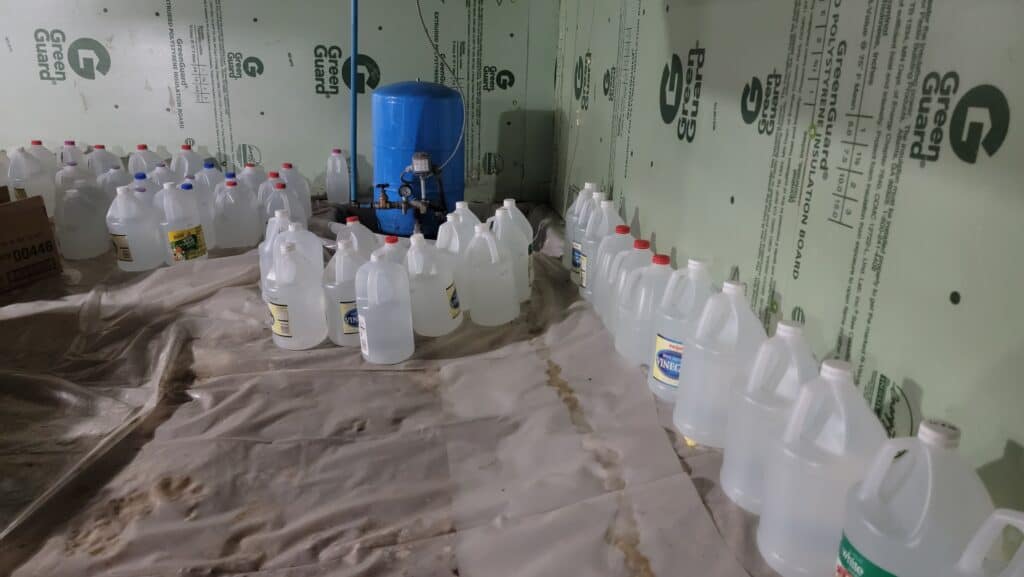
I started with milk jugs initially, and make sure to clean them very thoroughly with soapy water first and then bleach. This was actually pretty time consuming since I was worried about not getting all the milk out and having it turn rancid, and I found out after a year or two that milk jugs (and plastic 1-gallon water jugs) will rupture for no reason at all after a small amount of time.
A better choice is to use vinegar jugs (my favorite) or soda jugs. These have a thicker and more robust type of plastic that is designed to store acidic beverages. They will not spring a leak as long as you store your water away from sunlight (which you should do anyway).
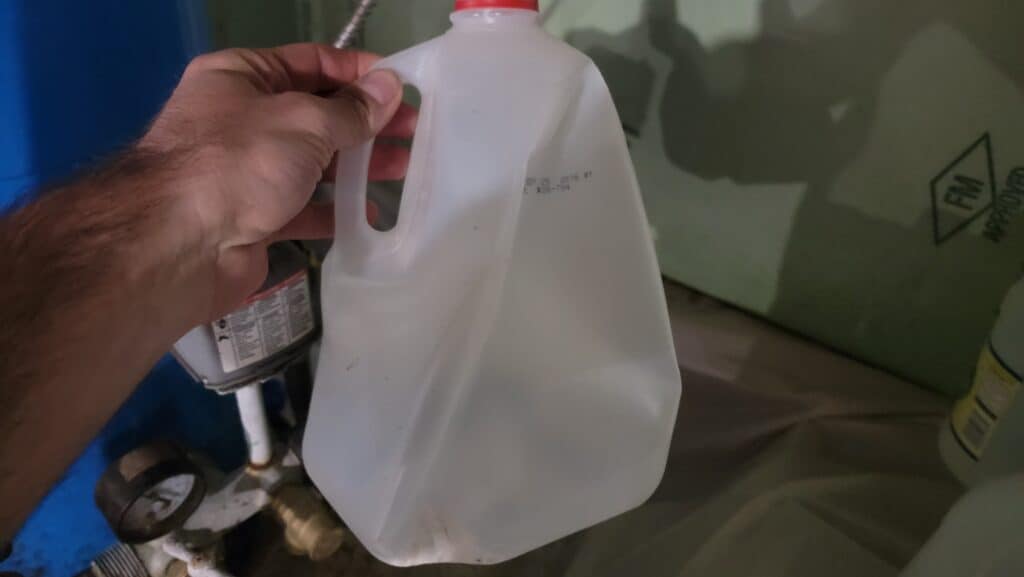
Vinegar jugs are easy to clean and actually do not retain their vinegar taste, believe it or not. I tested one out by simply rinsing it out twice with hot water and I couldn’t taste the vinegar whatsoever.
Vinegar jugs will not harbor any bacteria like a milk jug will if you don’t clean it well enough.
Take the following steps to ensure your water will last indefinitely:
- Pick a container proper for long-term storage (vinegar jugs prefered)
- Clean with dish soap and water and rinse out thoroughly
- Fill with water to the very brim
- A couple of drops of bleach (unscented) is optional but not required — may help neutralize aftertaste of a soda bottle
- Seal tightly and store in a location out of direct sunlight
- If your water tastes stale, pour the water from glass to glass several times to reintroduce oxygen into it, or partially fill a water bottle and shake it
Water won’t go bad (it may go stale, which is easily remedied) if the container was properly cleaned.
The expiration date on bottles of water that you buy is simply required by law. The bottle that it’s stored in may break down and cause the water to go bad, but the water itself will be fine. I have taken jugs from my crawlspace that were 4-6 years old and drank a full gallon without a problem. Shake some oxygen back in them and they’re good to go!
Finally, if you find yourself in a disaster where all water sources are questionable for drinking purposes, having a quality water filter is critical to keep you and your family properly hydrated and not getting sick from it. For personal use, having something like this reusable, filtered water bottle seen on Amazon is a must.
Tips for Conserving Water When the Power Goes Out
| Conserving Water |
|---|
| If you anticipate the power going out, it is a good idea to fill two mixing bowls with water. Make sure one has some dish soap added first. Now you’ll have one bowl for washing your hands and the other for rinsing. |
| If water is scarce, only flush if you have a #2. Keep the lid shut and the bathroom door shut to keep the smell out of the house for your #1’s. You could always flush at the end of the day if #1’s are all you have. |
| Fill a jar with vinegar and water and keep a rag in it for general cleaning and wiping surfaces. The vinegar will inhibit any bacteria from forming. |
| Take a sponge bath instead of a shower or keep baby wipes handy. I personally love Norwex Body Cloths which clean your body without the need to use soap (saves even more on water). Just get the Body Cloth wet and wipe away. I was leery about the soap thing, but they really leave me feeling clean. I use these all the time on camping trips or when traveling. Just dry them out in between uses and they do not smell due to the silver content that kills bacteria in the cloth. |
